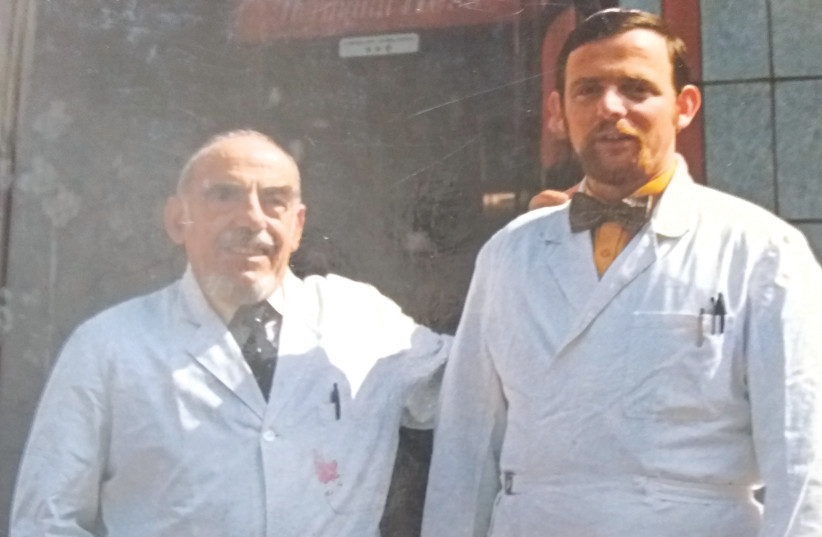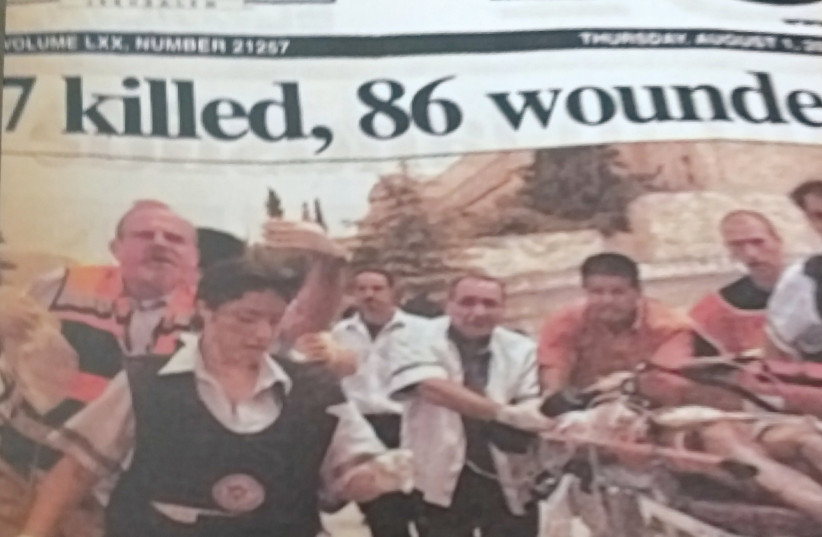The first time I saw Marcel Hess, I knew he was no ordinary man.
With his cigar, straw gondola hat, “a bow tie of many colors with clout,” and a huge St. Bernard dog named Bernie at his side, he was someone I had to know. As a photographer, he immediately caught my attention because of his air of certainty and charm, which he carries like royalty. As flamboyant as his exterior appears, it is his inner essence that my wife Arlene and I want to capture for this article.
It was easy to get to know Marcel and speak to him. It happens that we belong to the same synagogue, Ohel Yitzchak, in Rechavia. On several occasions, Marcel has not only sponsored a delicious kiddush (tables of flavorful delicacies such as kugels, salads, chopped liver and cakes which are put out for the congregation to whet the appetite before going home for lunch), he and his wife Suzanne actually prepared these delicacies. Marcel is known both in Israel and in Europe, particularly in Switzerland, as “The Kosher Sausage King.”
So, how does a man who is a master chef and a master butcher become a parliamentarian and a medical life saver?
Marcel was born in Amsterdam in 1951. At an early age, he moved to Switzerland. Following in the footsteps of his father, Hermann Hess, he became the sixth generation of master butchers.
He was the only religious Jew ever accepted into the Swiss Guild of Master Butchers, a prestigious organization founded in 1248.

Over the years, Marcel has won several medals for his meats and sausages. At age 18, he was invited to the White House to meet president Richard Nixon and prepare a meal for him. He had been recommended by a co-winner in a cooking competition.
What struck us so much about Marcel during our interviews with him is the fact that besides being an award-winning chef and butcher, an occupation which deals with slaughtering and blood, Marcel is so sensitive to saving and preserving human life.
He was trained as a medic and served in this capacity in the Swiss army. As a civilian, he was a one-man Hatzalah, saving lives in Switzerland and in Israel. Even his St. Bernard, Bernie sometimes wears a lifesaving kit around his neck.
He has received several medals and citations for saving lives. While on a flight on Swissair, a passenger lost consciousness and couldn’t breathe.
When a physician was called for, only Marcel stepped forward. He told the captain to call and have an ambulance waiting when the plane landed.
Meanwhile, Marcel performed CPR on the man and kept him alive. Later, when he was asked if he was a physician, Marcel replied that he was a butcher.

Marcel was pictured on the front page of The Jerusalem Post the day after the horrific and deadly bombing on July 31, 2002 at the Hebrew University of Jerusalem. He was one of the first medical responders at the scene.
WHERE DOES this sensitivity come from? Marcel’s earliest influence was his mother, Hilde Liezer. She was the head nurse of the Jewish hospital in Amsterdam and the only Jewish midwife whom the Nazis allowed to deliver babies during the occupation.
With tears in his eyes, Marcel told the heartwarming story of how his mother saved the life of a man who had been in a tramway accident in Amsterdam. The man was on the ground, bleeding profusely. His mother took off her only fur coat and used it as a pillow to put under the man’s head to provide comfort and warmth. Marcel said that he will never forget that great act of kindness.
His mother, of blessed memory, was so well known for acts of kindness that a book was written about her which Marcel treasures. The sensitivity for human life also came from his father, Hermann Hess. He was a fifth-generation master butcher. His portrait is hanging in the Historical Museum of Basel. During World War II, his father helped the Jews who were suffering and starving by giving them chickens for Shabbat, and meat as well. He did this for years.
Today, Marcel follows this tradition of generosity by preparing food for friends and fellow congregants, as well as distributing food to needy families. On Simchat Torah 2020, when COVID was at its height, Marcel and Suzanne prepared the most amazing COVID-safe celebration imaginable. Besides distributing ropes to use to keep the proper distance between individuals circling with the Torah, they also provided individual bags of delicacies for everyone to take home.
Recently, he made a special old European kiddish in the synagogue in memory of his mother. He wanted everyone to taste the flavors that he remembered so well. So he and his wife prepared special foods.
I EXPERIENCED Marcel’s generosity firsthand when I accompanied him on a busy Friday morning to the bustling streets of Mea She’arim. He took me to the famous Deutch’s restaurant. He went behind the counter and, as people came in, he asked what they needed for Shabbat and how big their families were. He then filled bags with food and paid for everything from his own pocket.
I was lucky when Marcel filled a plate with delicacies for me, which included cholent and kugels and other delicious food which I usually don’t eat on a Friday morning. I thought for sure that this would fill me up till Sunday, but I managed to eat my Shabbat meal.
What makes Marcel Hess so remarkable? One does not often meet someone who is a master butcher, a master sausage maker, a qualified and certified chef, a wine specialist, and… oh yes… a former member of Parliament in Basel. Marcel was the only kippa-wearing observant Jew to serve in Parliament, even getting reelected twice.
Besides all of this, he is a hotel manager, having received his BA degree from the Hotel School of Lausanne. He served as a concierge at the Palace Hotel in St. Moritz. He and his wife also owned and operated the Hess Restaurant on Shlomzion Hamalka Street in Jerusalem for many years.
What makes him the sausage king are the many awards and medals he has received over the years for his prize-winning kosher sausage. He won one of his gold medals in a sausage contest in which nobody knew that Marcel’s sausages were kosher. After tasting all the sausages, Marcel won the gold medal for first prize.
Marcel is a loving husband and father to his three children. He is also very close to his beautiful grandchildren. He is a proud Zionist, and he is given the honor of blowing the shofar on the Haas Promenade on Independence Day.
Marcel has had an extremely full and successful life. I asked him, after hours of conversation, to tell me what his message is for achieving a meaningful life. This is what he said:
“You shouldn’t look for money when choosing a profession. Money comes and goes. I have had satisfaction in my culinary career and in saving human lives. You must have satisfaction in what you choose to do. You will go much further if you get satisfaction.”
He gets great enjoyment seeing his children and grandchildren living in Israel, where they are living a truly Jewish life. Future plans? Marcel is now in the process of writing an autobiography and a book about the coronavirus and its effect on humanity.
The writer’s wife, Arlene Gherman, coauthored this article.
Three recipes from Marcel Hess
Stuffed Chicken, Hess Style
1 large roasting chicken
1 large onion
Parsley, garlic, black pepper
2 eggs
6 chicken livers
1 large piece of stale challah
Olive oil
Optional: BBQ sauce, sweet and sour sauce
Soak the stale challah in water. Then squeeze out the water and tear it into small pieces. Put into a bowl.
Add 2 Tbsp of chopped parsley. Cut the onion into thin slices and fry in olive oil till golden. Beat the two eggs and mix all the ingredients together. You may add sliced mushrooms if you want. Cut the chicken livers into small pieces and mix into the bowl.
Stuff the chicken with this mixture. You can use a needle and thread or toothpicks to close the cavity of the chicken after it is stuffed. Place the chicken in a roasting pan and roast at 180 degrees C for 30 minutes on one side and then 30 minutes on the other side.
Remove the chicken from the oven and add garlic pieces and a little olive oil on the outside. You may put BBQ sauce or sweet-and-sour sauce over the chicken as well.
Put the chicken in the oven at 120 degrees C for half an hour uncovered.
Remove it and use a meat thermometer. It should be 80 degrees on the inside.
Serve with farfel.
German-Style Sauerbraten
1.8 kilo beef roast #5 or #6
1 kilo root vegetables (potatoes, yams, celery, carrots, onions, parsnips)
1 bottle dry red wine
3-4 garlic cloves sliced
5 bay leaves
English pepper (pilpul)
Apple cider vinegar, 2 cc
Corn starch
Mix the wine and the apple cider vinegar, adding pepper to taste. Place the meat in a pan and place slices of garlic over and around the meat. Pour the liquid over the meat, covering it completely. Add water if necessary. Cover and place in the refrigerator for at least three days.
Take the root vegetables and cut them into large pieces. Place them in a pot with more of the red wine and apple cider vinegar mixture, and cook them until they are al dente/firm. Allow the vegetables to cool and refrigerate them.
After three days, remove the meat from the refrigerator. Pour the liquid out of the pot and save it to add to the meat later.
Preheat oven to 110 degrees C. When the oven is hot, put some oil under the roast, cover it and place it in the oven for 5 hours. After 5 hours, remove the pan from the oven. Place the root vegetables around the roast and add most of the liquid. Put it back in the oven at 150 degrees C for one hour, covered with aluminum foil. Place some small holes in the foil.
When you remove it from the oven, take out some gravy and mix it with corn starch. Use some cold water mix with 2 to 3 tablespoons of corn starch and add to hot gravy. Simmer for another 10 minutes. Mix well until smooth.
Vegetarian/Dairy Cholent
Everyone always asks, “Marcel, why do you only have recipes for meat? What about us vegetarians?”
So, I will now share a recipe that has no meat, for those of you who are vegetarians but love the taste of cholent.
200 gr. brown beans
200 gr. small white beans
150 gr. large white beans
1 onion, sliced and fried in the pan, until it gets a nice brown color
1 Tbsp. chicken-flavored parve soup powder
1 Tbsp. onion soup powder
200 gr. Gruyere or tilsiter cheese, shredded coarsely
4 medium-sized potatoes, with the skins
Water
BBQ sauce and ketchup
3 cloves of sliced garlic (optional)
Soak the beans in cold water overnight, so that they double in size. The next day, throw out the water. Add fresh water to cover the beans, and cook them in a Crock-Pot with all the spices, including the ketchup, barbecue sauce and 3 cloves of sliced garlic.
Cook until the beans are soft. Add 4 medium-sized potatoes and put the entire mixture in the oven at 180 degrees C, with the shredded cheese. Cook until it gets a golden color.
Replace the dish into the Crock-Pot, and add 3 glasses of water. Cover and cook on a low setting. Add more water if needed (the dish should always have a sufficient amount of water). If needed, uncover the dish on Shabbat, to reach your desired consistency.
Serve hot. You now have a dairy, vegetarian cholent. Enjoy!
